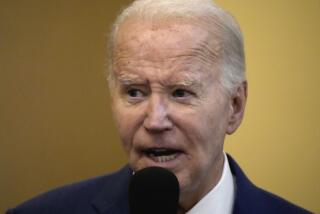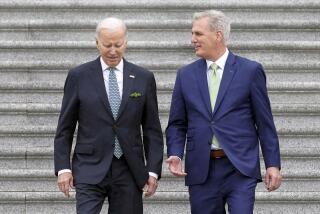Clinton Gears Up to Lobby Lawmakers on Trade Pact
WASHINGTON â After months of external distractions and internal dissension, President Clinton Thursday launched what is likely to be one of the most difficult political campaigns he will undertake this year: convincing a wary Congress that it should approve the three-way trade agreement with Mexico and Canada.
In an Oval Office ceremony, Clinton announced his choice of Chicago attorney William Daley to orchestrate the Administrationâs sales effort on behalf of the North American Free Trade Agreement.
With the budget battle behind him and full congressional debate on health care reform probably a year away, the effort to win House and Senate approval of the trade accord is shaping up as the biggest challenge facing Clinton in coming months--and one that finds him counting more heavily on Republicans than on his own Democratic allies to anchor congressional support for the agreement.
If politics make strange bedfellows, said political scientist Ross Baker of Rutgers University, âthese are the strangest sleeping partners ever.â
âThe President will find his strongest supporters among those who were his strongest antagonists--a Reaganite could really be happy with this--and on the other side will be the building blocks of the Democratic constituency, organized labor,â Baker said.
Opponents and supporters of the trade pact are unanimous in their assessment that the outcome will remain in doubt until a vote is taken in late autumn.
âThis is going to be hand-to-hand combat,â a senior Administration official said.
Clintonâs fight is made all the more complicated by a division among his advisers. Political aides and others most closely allied to the traditional Democratic constituency--made up of organized labor and to a lesser degree environmentalists--argue that White House support for the agreement is a political loser and that Clinton should walk away from it. But others--among them economic policy adviser Robert E. Rubin, Treasury Secretary Lloyd Bentsen, counselor David Gergen and White House Chief of Staff Thomas (Mack) McLarty--maintain that the pact, in the long run, will serve the nationâs economic interests.
The President, whose low-profile approach to the issue has irked supporters of the agreement, announced his choice of Daley before embarking on a 10-day vacation on Marthaâs Vineyard, an island off the Massachusetts coast.
Outlining the case that he will make throughout the fall, beginning with what some strategists hope will be a major speech on the subject next month, Clinton said: âThis trade agreement means a better future for Americaâs workers, for American industry, for the American economy.â
The 45-year-old Daley, brother of Chicagoâs current mayor and son of the cityâs late political boss, Richard J. Daley, said in an interview that his job would entail coordinating the Administrationâs campaign and working to drum up pressure on Congress, as well as solving individual House membersâ problems with the agreement.
âWe will have the function of the war room,â he said.
The importance to the White House of avoiding defeat of a major foreign agreement in Congress, where the Presidentâs party controls majorities in both houses, can hardly be overstated.
With Clintonâs presidency having gotten off to a rocky start, one Republican operative who favors the agreement said that âif he loses this, it will be clear to the world he canât deliver, and that at home he can be rolled by his own party.â
Clinton has been nearly silent on the matter for months, while opponents lined up allies among lawmakers representing districts fearful that the agreement will encourage employers--enticed by cheaper production costs stemming from lower wage rates and lax enforcement of environmental laws--to move their operations to Mexico.
The Administration has countered that the agreement, by removing tariffs and other obstacles to cross-border trade, will promote Mexican purchases of goods manufactured in this country. It also has said that there is little that prohibits manufacturers from moving to Mexico now. And, it now says, provisions just attached to the agreement would protect labor and environmental standards.
But the campaign on behalf of the agreement has lacked the firepower to counter such critics as Ross Perot, who has made its defeat a theme of his public operations this year.
The White House was counting on a surge of support last Friday after an announcement that the three nations had completed the supplemental agreements. But, said Rep. Robert T. Matsui (D-Sacramento), a leading supporter: âThe problem is we didnât get the bounce we had hoped for.â
One of the keys to passage will be Majority Leader Richard A. Gephardt (D-Mo.), a leading figure in trade debate in the House who said after the supplemental agreements were unveiled that he could not support the accord in its current form.
Administration officials are optimistic that Gephardtâs objections--which involve the cost of cleaning up the U.S.-Mexican border environment and protecting U.S. workers from surges in imports from Mexico--can be met in the legislation implementing the agreement.
With hearings beginning shortly after Labor Day, the issue is expected to command congressional attention throughout the autumn, with the Administration focusing its attention on the House. Clinton aides are more confident that they can prevail in the Senate.
More to Read
Get the L.A. Times Politics newsletter
Deeply reported insights into legislation, politics and policy from Sacramento, Washington and beyond. In your inbox three times per week.
You may occasionally receive promotional content from the Los Angeles Times.










